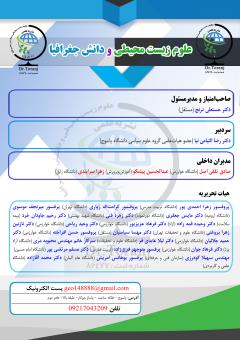تأثیر حقوق اساسی دانشآموز در آموزشوپرورش
محورهای موضوعی : علوم برنامه ریزی
1 - دانشگاه آزاد بندرعباس
کلید واژه: حقوق دانشآموز, حقوق اساسی دانشآموز, اصول حقوقی دانشآموز, نظام تربیتی ایران,
چکیده مقاله :
حقوق دانشآموزی شامل کلیه حقوقی میباشد که یک فرد در حال تعلیم و یا به سبب تعلیم در نظام آموزشوپرورش کشور از آن بهرهمند میباشد. هدف اصلی پژوهش حاضر تأثیر حقوق اساسی دانشآموز در آموزشوپرورش است تا با اتکاي به آن، وظایف، تعهدات و مسئولیتهای معلمان، مسئولان مدرسه و سایر افراد دستاندرکار تربیت دانشآموزان شناسایی و معرفی شوند. پژوهش حاضر مطالعهاي کیفی است که با بهرهگیري از روش تحلیل محتواي کیفی از نوع طبقهبندي استقرایی انجامشده است. مرور نظاممند و تحلیل منابع حقوقی به تدوین مجموعهاي از اصول تحت عنوان اصول حقوق در آموزشوپرورش منجر شده است. این اصول استخراجشده چهاردهگانه بر اساس میزان استناد در منابع قانونی موردمطالعه در سه دسته تصریحشده در قوانین رسمی (مشتمل بر دسترسی به آموزش رایگان، تسهیلات تربیتبدنی و برخورداري از آموزش عالی)، تأییدشده در قوانین رسمی (مشتمل بر تأمین اجتماعی، آزادي انتخاب نوع و شیوه آموزش، ارتقاي سطح دانش و آگاهی عمومی، آموزش به زبان مادري، امنیت تحصیلی، برخورداري از حقوق مساوي و آزادي فعالیتهای سیاسی و اجتماعی - فرهنگی) و تصریحشده در قوانین آموزشوپرورش (مشتمل بر پرورش خلاقیتهای هنري، ارتقاي امکانات و فرصتهای مناسب اوقات فراغت، هدایت و راهنمایی تحصیلی و تسهیل شرایط آموزش کودکان با نیازهاي ویژه) طبقهبندیشدهاند. پیشنهاد میشود در مطالعات آینده الگوي مفهومی استخراجشده از نگاه صاحبنظران و متخصصان حقوقی و تربیتی مورد واکاوي قرار بگیرد و با اعمال نظرات آنان تعدیل و اصلاح شود.
Student's rights include all the rights that a person who is studying or because of studying in the education system of the country enjoys. The main goal of the current research is the effect of the basic rights of students in education, so that by relying on it, the duties, obligations and responsibilities of teachers, school officials and other people involved in the education of students can be identified and introduced. The current research is a qualitative study that was conducted using the qualitative content analysis method of inductive classification. A systematic review and analysis of legal sources has led to the formulation of a set of principles under the title of principles of law in education. These fourteen extracted principles are based on the amount of citations in the studied legal sources in the three categories specified in the official laws (including access to free education, physical training facilities and access to higher education), approved in the official laws (including social security, freedom of choice and The method of education, raising the level of knowledge and public awareness, teaching in the mother tongue, academic security, enjoying equal rights and freedom of political and socio-cultural activities) and specified in the laws of education (including the cultivation of artistic creativity, promotion of facilities and suitable opportunities for leisure time , academic guidance and facilitation of education conditions for children with special needs) are classified. It is suggested that in future studies, the extracted conceptual model should be analyzed from the perspective of experts and legal and educational experts and adjusted and modified by applying their opinions.
• موسوی، عبدالرازق، (1381)، حقوق و مسئولیت آموزش پرورش در حقوق ایران و سند بینالمللی توصیه نامه. پایان نامه کارشناسی ارشد، دانشگاه تهران
• Covell, K, Howe, R. B, & McNeil, J. K. (2010). Implementing children’s human rights
education in schools. Improving Schools, 13(2), 117-132.
https://doi.org/10.1177/1365480210378942
• Covell, K, Howe, R. B, & Polegato, J. L. (2011). Children’s human rights education as
a counter to social disadvantage: A case study from England. Educational Research,
53(2), 193-206. https://doi.org/10.1080/00131881.2011.572367
• UNICEF. (2014). Child rights education toolkit: Rooting child rights in early childhood
education, primary and secondary schools. Geneva: UNICEF Private Fundraising
and Partnerships Division.
• Osler, A, & Starkey, H. (1998). Children’s rights and citizenship: Some implications
for the management of schools. The International Journal of Children’s Rights, 6(3),
313-333. https://doi.org/10.1163/15718189820494085
• Tibbits, F. (2010). Impact Assessment of the Rights Education Action Programme
(REAP). Final Report Submitted to Amnesty International Norway. HREA.


